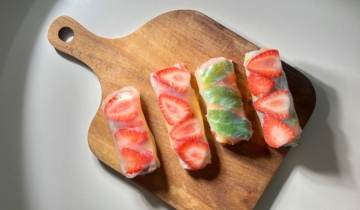pH, probiotics and vaginal douches… where is my flora at??
MICROBIOME is the hot topic du jour. Most people will think of gut microbiome and probiotics but it actually refers to all the genetic material found in the microbes living on and in your body – and there are many; current estimates show that there are as many bacterial cells in the body as human cells.
The vagina has its own microbiome despite the limited amount of research – because surprise it is lagging (Hello researchers! We are looking at you!). Know this: Your vaginal flora does not need an upgrade. Let’s get this straight: your bacteria protects you, as much as the ones on your skin do. Think of them as your friends, not parasites. They are there for a reason: stimulating your own immune system, and there is promising new research to aid in new diagnostic tests and treatment but much more research needs to be done – especially in the way of probiotics.
Let’s dive in!
My pH…
Think of the vagina as a self-cleaning oven.
Because the vagina communicates with the outside, its epithelium is colonized by bacteria. Its weakly acidic environment protects from bacterial overgrowth that might lead to infection – for instance if the vaginal pH becomes basic due to Gardnerella overpowering the Lactibacilli, it may result in symptoms of bacterial vaginosis.
Women need to understand that the degree of acidity is not corrosive and that pH is controlled by endogenous vaginal factors (estrogen and lactobacilli), but NOT by diet, hydration, or the use of probiotics – from what we can scientifically rely on. The acidic environment is beneficial for you, douching with vinegar produces a transient change in pH and would never be recommended (because of its risks to the upper genital tract).
But, does my vagina need probiotics?
Why would you want more bacteria if you feel ok? Do you want more discharge? Really??
Current studies we have are made to evaluate if there are advantages in the use of probiotics to treat vaginal infection and here is the result: there is no evidence that women with recurrent vulvovaginal candidiasis have vaginal flora deficient in lactobacilli, and therefore it is not recommended to use probiotic lactobacilli to treat a yeast infection.
Although there is a popular belief that ingestion or vaginal administration of yogurt or other agents containing live lactobacilli decreases the rate of candida colonization and improves symptoms, the few studies in this area have several methodological flaws and small numbers of subjects, so this approach is considered unproven. The probiotics that are marketed as promoting a healthy vaginal microbiome do not have enough long term data, and more evidence is needed before confidently standing behind this kind of treatment. And don’t forget that the quality of probiotics varies worldwide; they are nutraceuticals and NOT pharmaceutical products (they have a NPN and not a DIN), and these products are not standardized and are often of poor quality.
Will what I eat change my flora??
Unfortunately, no controlled studies were made to evaluate the role of diet in preventing and controlling candida vaginitis, therefore no specific diet is recommended. Occasional patients report precipitation of episodic vaginitis after consuming beer or refined sugar products, especially after a hangover or a food coma after a trip to the sugar shack ?… you can always simply avoid those precipitating food items or alcohol, but this often is insufficient to resolve symptoms.
But, could my vagina be “cleaner”?
Remember – self cleaning oven!
Many women believe that the vulva and vagina are dirty. In addition, many think that the area should be dry and free of odor. Contemporary marketing practices for feminine hygiene products sometimes make us feel like we could even be cleaner or smell better, and it is not rare that women come into my office with more harm than good after using these products.
Douching
Vaginal douching, at best, has no benefits, and is even associated with an increased risk of pelvic inflammatory disease, bacterial vaginosis, cervical cancer, low birth weight, preterm birth, HIV transmission, STIs, ectopic pregnancy, recurrent vulvovaginal candidiasis, and infertility… It appears that, with its lack of efficacy as well as its potential for disruption of normal vaginal ecology, douching should be discouraged in all women, especially patients with vulvovaginal problems.
Sprays and deodorants
Likewise, “feminine care products” are unnecessary and contribute potential contact/ irritant exposure to women who use them. Women should avoid application of feminine sprays, douches, powders, wipes, or other personal care products, prescription or over-the-counter topical preparations, herbals or natural oils not specifically recommended by an educated clinician. But, nevertheless, if you try something that you like and that does not harm you, the choice is all yours!
Bathing practices
Either baths or showers are acceptable, but prolonged soaking in hot water dries the vulva, and is to be avoided.
Some women do not wish to touch themselves and may do a cursory washing job. There is no medical evidence that smegma accumulation is a source of irritation or infection. The concern for infection, however, may lead some women to scrubbing with a cloth, sponge, or abrasive material that can increase irritation. Gentle fingertip washing is suggested. Scrubbing is never needed. A handheld shower is invaluable for any woman, especially when she is having difficulty reaching the anogenital area.
You may be surprised to learn that for appropriate vulvar care, soap is not even considered necessary, especially anti-bacterial ones. A safe soap is Dove® bar with 50% cold cream or Cetaphil lotion cleanser®. Ivory® is pure soap and therefore drying. Soaps with essential oils such as lavender, though natural, can be irritating. Aloe, though natural, is also highly sensitizing to some women. Body washes contain multiple chemicals with the potential for triggering contact dermatitis.
What is “normal“ well-being when it comes to my vagina?
“Well-being,” to most, means being completely comfortable and unaware of the vulva. Meaning no pinching, stinging, itching, irritating, swelling, or pain. Women make choices about devices, products, articles of clothing or cleansing techniques based on what their mothers taught them or current styles, like what their friends, TV programs, or internet and magazines are telling them… without respect to their vulvar comfort.
Sometimes, something so simple such as wearing urine protection pads or thong-type underwear, tight jeans or even the shaving of pubic hair can actually make you life feel like hell… Use of medicated products (to tighten the vulva, like salicylic acid cream or spray) may cause irritant reaction. Some tips look quite simple, but I have learned in my practice that education of women about what may help at this basic level is clearly underrated! Sometimes, the simplest answer is the best one.
Everyday choices may significantly affect a woman’s sense of well-being in the vulvovaginal area. There is no standard at which to judge a ‘’normal’’ vaginal microbiome, which will determine a particular woman has enough ‘x’ bacteria, etc. The uniqueness of women is expressed in our individuality as well as in our vaginal microbiome. A healthy microbiome will be determined on whether or not you are experiencing symptoms – so listen to your body and also find a practitioner that is open and willing to discuss your individual concerns. Sometimes just being heard is enough to put your mind and vagina at ease.
Signing off,

http://drgabriellelandry.com/
Feature image via Pinterest





 No products in the cart.
No products in the cart.